This post contains affiliate links.
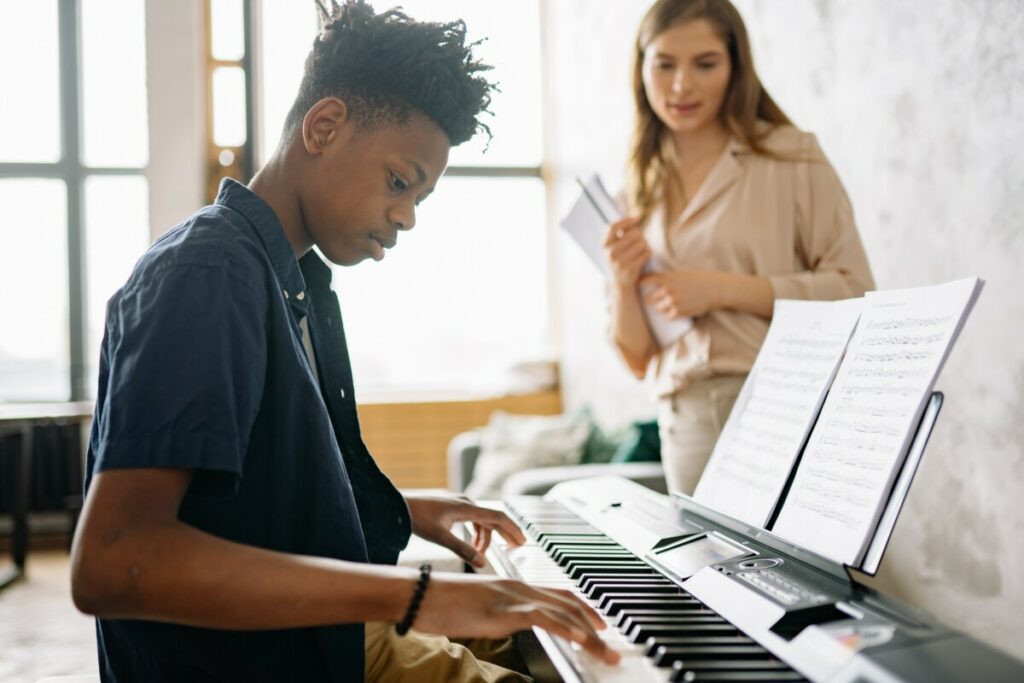
As a piano player, the different lesson length options offered may feel intimidating. This is doubly true if you are self-taught or an adult not sure how long your lessons should be.
As a general rule, 30 minutes lessons are for beginners, 45 minutes are for intermediate and 60 minutes are for advanced students. There are other factors that will determine the most suitable lesson length for you like your goal, attention span, budget and how often can you practice piano.
Choosing the correct lesson length for you will make sure you improve with the piano effectively and efficiently, making the most out of your hard-earned dollars.
This article will go through in detail a few factors to consider and give you some guidelines on choosing the most suitable piano lesson length for you. I’ll also talk about the group piano option and what length you should choose, along with choosing lesson length for kids if you’re a parent.
What lesson length options are out there?
The most popular options offered by piano teachers are 30, 45, or 60 minutes lessons.
Here’s an example of a price chart of a piano shop near me that offers piano lessons (the currency is in CAD – that’s why it’s so cheap):
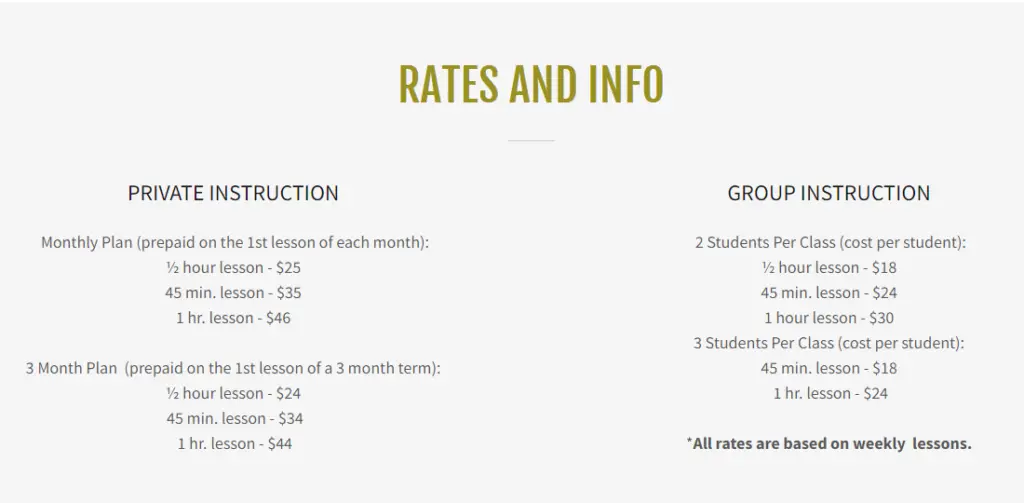
No lessons are less than 30 minutes since there won’t be enough time and the student won’t be able to learn a lot in lessons less than 30 minutes.
Even a 30 minutes lesson may not feel like enough for some people. I personally got 30 minutes lessons in the past and usually, just when I feel like I’m really getting into the mode of learning, the lesson ends.
Usually, no lessons are more than 60 minutes since an hour is usually enough to cover and teach all the materials needed, even for more advanced students. Also, lessons more than 60 minutes can burn out both the teacher and student, making the lesson a lot less effective if continued on any longer.
Here’s a table giving you a rough guideline on choosing the right lesson length, based on your age and skill level:
| Beginner | Intermediate | Advanced | |
| Age 5-6 | 10-15 minutes | 20-30 minutes | Unlikely, unless your child is a prodigy 🙂 |
| Age 7-9 | 15-20 minutes | 30-40 minutes | 40-60 minutes |
| Age 10+ | 20-25 minutes | 30-45 minutes | 45-60 or more minutes |
Of course, there are other factors to consider like what’s your budget like, how far you want to get with the piano or how quickly you want to improve. This table is meant to give you a quick look at what option may be suitable for you.
Factors to consider when choosing lesson length
There are 6 factors to consider when choosing piano lesson length:
Your skill level
Depending on your skill level as a pianist, a certain lesson length will be more beneficial to you compared to others since you cover more materials and techniques as you advance in skills.
Beginners – 30 minutes: as a beginner playing the piano, regardless of whether you are a child or an adult, your piano teacher will most likely get you started by having you go through a basic children’s lesson book.
This is to get you familiarized with the layout of the piano sheets and let you practice some simple tunes in a simple time like 4/4 where there are 4 beats in each measure. You will also get used to playing with both hands at the same time – which some people may struggle with.
Since you’re just learning the A, B, C of reading sheets and playing piano, 30 minutes lessons is more than enough to let you practice through these books.
Here’s an example of a lesson book I went through when I was a beginner:
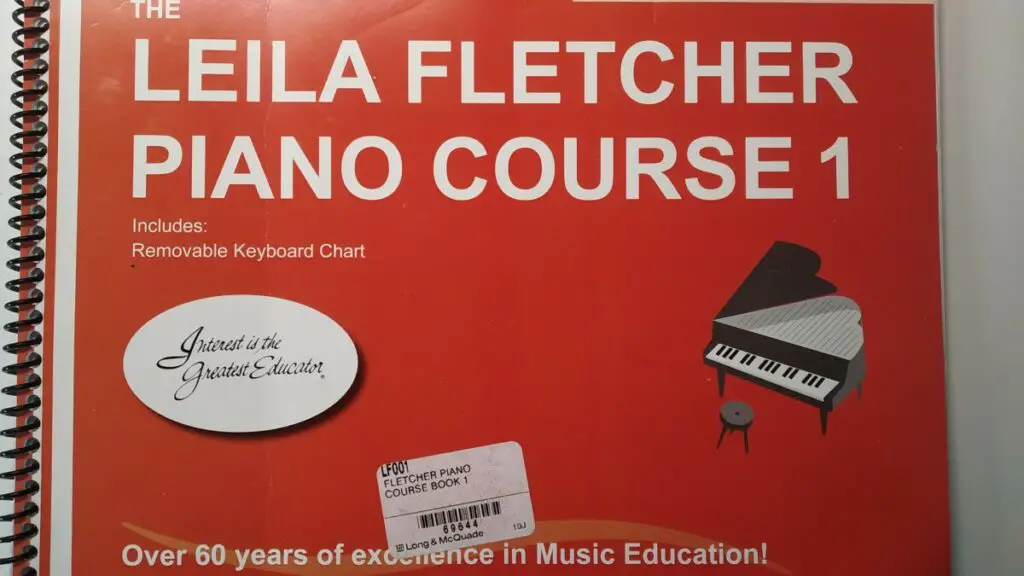
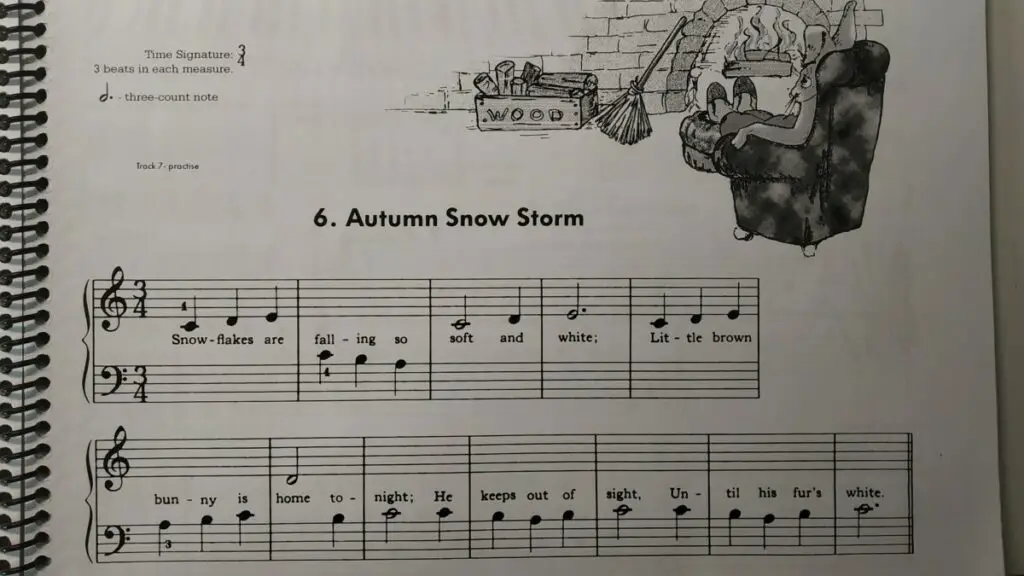
Intermediate – 45 minutes: As you get better at playing the piano, your teacher will stop having you go through lesson books and give you actual piano pieces to learn how to play.
These pieces are usually classical since classical pieces are excellent at teaching students techniques and control, and developing finger strength.
As you transition from playing simple tunes to full-on classical pieces, the bar is definitely raised higher in terms of quality and difficulty, requiring at least a 45 minutes session so your teacher and go through the piece with you, teaching you new concepts and fixing any mistakes you may make while playing.
Advanced – 60 minutes: At this level, you’ll continue to be given harder and harder pieces, and the teacher will start developing other skills like sight-reading – reading from the sheet and playing at the same time – or have you play scales to develop your finger strength, to further improve your playing skills.
At this point, there will be a routine created and done in every class. It could go like this: first 10 minutes for playing scales, next 10 minutes for sight-reading practice, 10 min for teaching you new music concepts, then 30 minutes to work on your piano piece.
If you know your 1+1, then it clearly adds up to 60 minutes.
More advanced students that are doing the RCM ( Royal Conservatory of Music) program may need even more than 60 minutes since the exams in that program have very high standards, almost demanding perfection, which requires a lot of time and effort to perfect playing a piano piece.
Your budget
Although the piano is a lot more accessible to the public compared to the early days when only the upper class of society have access to the piano, piano lessons prices are nothing to sneeze at with 30 minutes lessons starting from USD 40 for decent teachers.
This is why if you can only afford 30 minutes lesson, then that’s how long you’ll get. You can try looking to see if the piano place or teacher offers any discount for paying upfront in advance for a couple of months at a time, essentially locking you in pseudo-contract.
Note that usually, the 60 minutes option is cheaper when you calculate the cost per 30 minutes compared to 30 minutes lesson. You may consider taking a 60 minutes lesson every two weeks instead of a 30 minutes lesson weekly. I would advise against this since, in weekly lessons, the teacher can give you goals to work on weekly, making sure you are constantly practicing, even if it’s shorter in duration.

You can also look into other options like for example, the music major students in the university near my house are offering to teach piano at half of the market’s price for the same amount of time.
However, keep in mind that these students lack teaching experience and are suitable if you are a beginner.
If you are a more advanced player and need to learn technique and polish your playing from someone with experience and training, it’s worth paying more to get a decent teacher since you’ll just be wasting time with a less experienced teacher.
Your attention span
Everyone has a different attention span. Some can work for 5 hours straight with no breaks in between while others need a quick 5 minutes break for every 30 minutes of work. For me, I can only concentrate on studying for about 2 hours before I lose focus and start watching some Indian dudes building a swimming pool on Youtube.
This is the same for learning piano, once we hit our limit, any more time will be wasted since we can’t focus and will keep getting distracted.
This is why if you can focus more than 30 minutes at a time, consider looking into 45-minutes or 60 minutes lessons to maximize your learning potential and improve quickly.
Also, keep in mind that attention span is something that can be built up and you’ll gradually be able to focus on longer length at a time as you keep learning.
How much time do you have to practice piano?
Choosing lesson length also depends on how much time you can spend practicing piano on your own time since it is the more effective way to improve at the piano.
Lessons with your teacher should be reserved for developing techniques, fixing any mistakes made during your practice, giving you directions on what to work on and answering any questions you have.
This way you can avoid wasting time practicing piano pieces that could be done on your own time, making sure you’re getting the most bang for your bucks and improving at the fastest pace.
The way to practice at home is to practice scales, work out the parts you can in your piano pieces, the part where you get stuck is what you should ask your teacher and work on during the lesson.
The best way to practice piano is to create a routine where you will sit down at the piano at the same time every day and practice for a set amount of time, at least 30 minutes. This is more effective than practicing for 1-2 hours in one day, then doing nothing on the next day.
If it’s hard to sit down for 30 minutes at a time, you can try reducing the time to 15-minutes per day, the more important thing is to have a routine where you practice piano every single day. Once you get comfortable with 15 minutes, you can bump it up to 20, then 30 minutes and more.
With that said, if you are a busy person with responsibilities to deal with, and can’t make time in your day to practice piano, then 30-minutes will be more suitable for you since longer lessons will just be a waste of time. Unless you enjoy the company of your piano teacher and don’t mind paying a little more for longer lessons.
Your goal with the piano
If you have high goals with the piano, like one day being able to play in piano competitions or play in orchestras, then you will need 60 minutes or longer piano lessons since more dedication and time are needed to hone and perfect your skills.
If your goal is to play leisurely and you are in no rush to improve and want to enjoy the slow but steady progress, then 30 minutes lessons are perfect for your needs.
If you are a beginner and want to improve at the piano as quickly as possible, then you may choose 45 minutes lessons since 30 minutes lessons can feel too short and not enough to learn, provided you can practice even more on your own time.
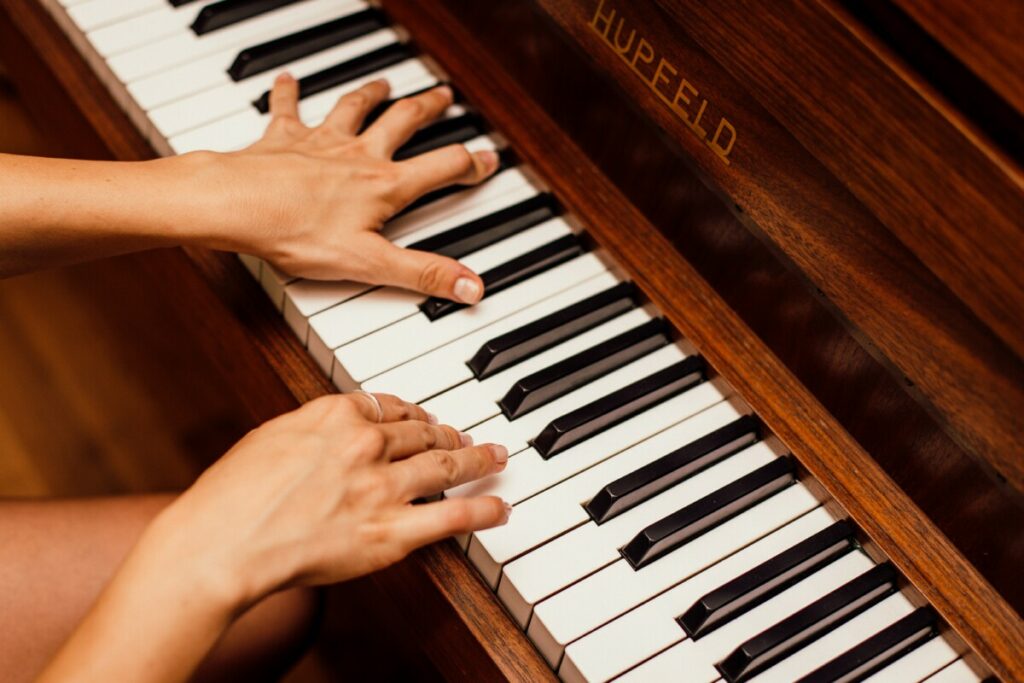
Is your teacher the talkative type?
This may sound odd, but how talkative is your teacher can determine how long should your lesson be. Some teachers have a trait where they’ll spend 2 minutes explaining a concept that can be done in 2 sentences. This is something that’s innate to the teacher and you can’t do anything but accept it.
Some teachers are intense, serious, straight to the point where all they talk and teach about in class is piano-related only. I have a friend whose piano teacher didn’t even know he had siblings after spending 5 years learning with each other because that teacher was very focused and didn’t want to waste time on unnecessary chit-chat.
For these teachers, even 30 minutes lessons are highly effective since you’ll be breathing piano the moment the timer for the lesson start ticking.
However, some people may enjoy friendlier teachers that make small talk during lessons since it feels more personal that way, and the lesson won’t feel so serious or uptight. These people may need longer lessons to compensate for the lost time in small talks.
How many lessons should you take per week?
For most people, 1 lesson per week is enough since you will need a week to work on whatever homework your teacher gives you for that week. Also, most people have other responsibilities and can’t commit to playing piano all the time.
However, if you want to progress quickly, you may consider taking a second lesson for the same week to cover music theory or revise what was learnt in the first lesson. Music theory is the language used to write music, by learning it, you will understand concepts like key signatures, rhythms that are present on piano sheets, ultimately making you a better pianist.
In some cases, some students may find it difficult to practice piano on their own, either because of a lack of discipline or some learning disability. A second lesson in the same week and help get them used to the habit of practicing piano.
Group piano lessons length
For group piano lessons, the same options for 30, 45, 60 minutes are offered in groups of 2-4 students.
If you are looking into this option, go for the longer option since each student in the group gets less time from the teacher to take a look at their playing.
For a beginner, the 60 minutes group lesson is great since each student in the group will get adequate time from the teacher, there’s not a heavy emphasis on techniques that require one-on-one sessions for beginners, and if all the students in the group are at the same level, there’s an added bonus of competition between peers that will push each other to improve.
Lesson length for kids
Kids have a shorter attention span compared to adults, so longer lessons won’t be effective since they can’t focus as long and their fingers will tire out quickly.
If as a parent, you still want your child to have a long lesson, consider maybe splitting that one long lesson into 2 smaller lessons in the week. For example, instead of one 30 minutes lesson, you can try splitting it into 2 15 minutes lessons per week.
Once your kid shows progress and more interest in the piano, start discussing with their teacher whether longer lessons are now suitable for them.

Final thoughts
When looking into the length of piano lessons, if money isn’t the problem, then skill level should be the most important factor to consider, then to other factors like your goal, your attention span or your teacher.
This is because the level you are at dictates what you’ll need to learn and how time will need to be spent in class accordingly.
Remember that practicing piano on your own time is more important than having longer lessons. You will be able to progress much more quickly and save a lot of money in the process of doing so.
If you’re looking into getting group lessons, go for the 60 minutes to make sure you get enough time with your teacher. Once you improve and get more advanced, switch to getting one-on-one lessons
For kids, make sure they don’t take lessons that are too long since they will lose focus can’t learn anymore, losing you money for no reason. Also, by forcing them to do something once they lost focus, you may run the risk of making your child hate and dread playing the piano.
As you decide on the lesson length and start taking lessons, you may also want to know when is the right time to stop taking lessons, check out When should You Quit Taking Piano Lessons.

